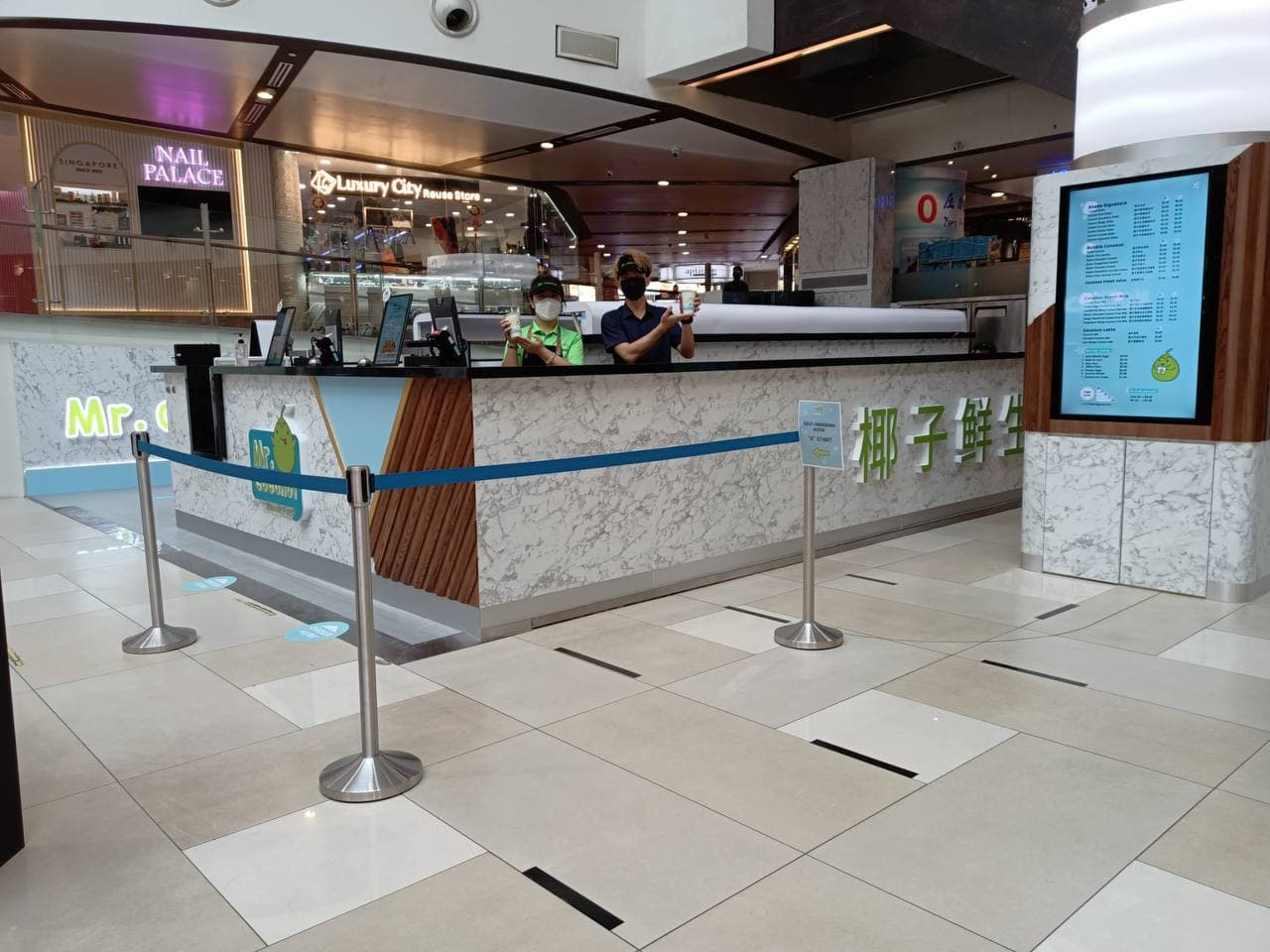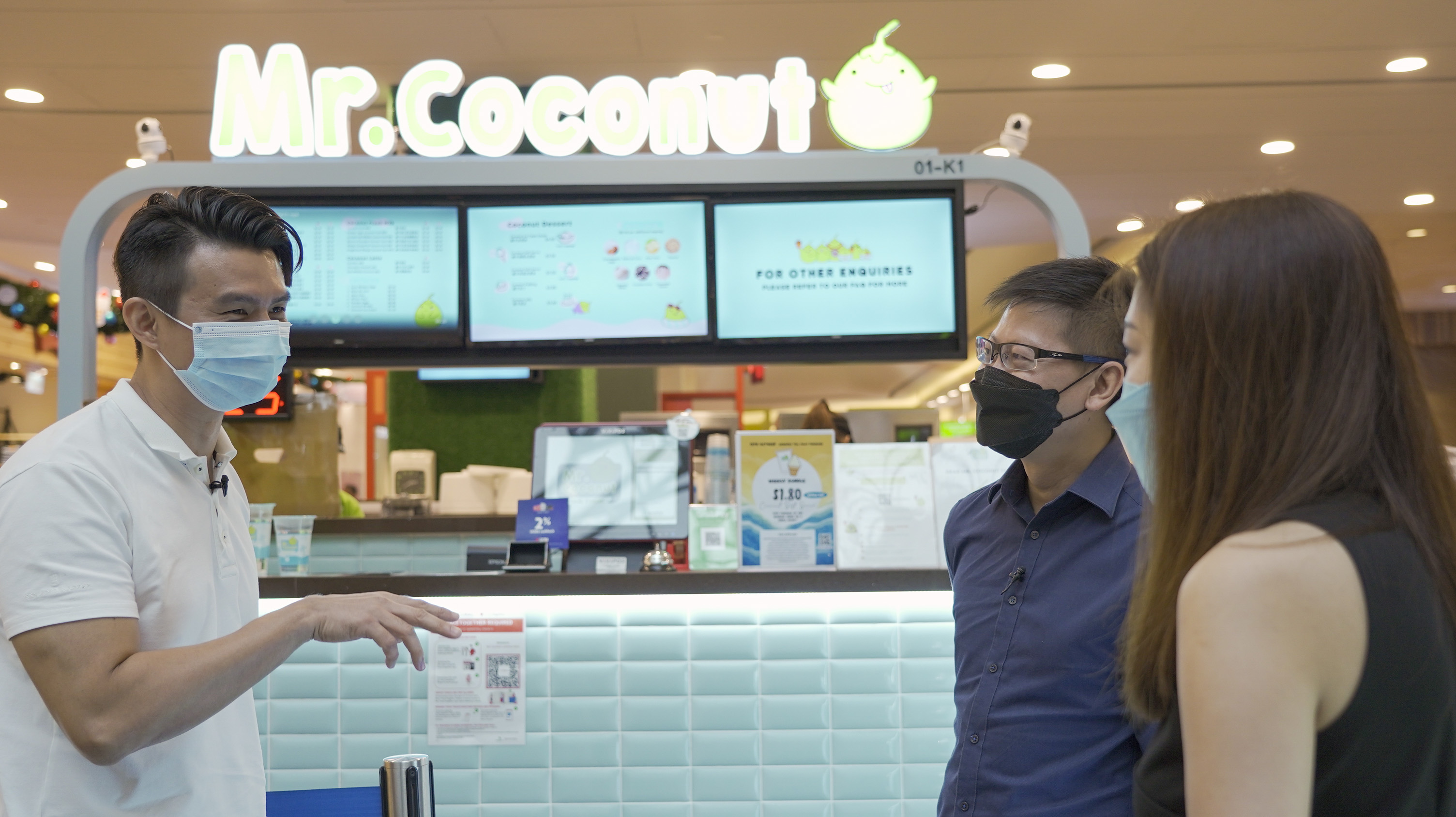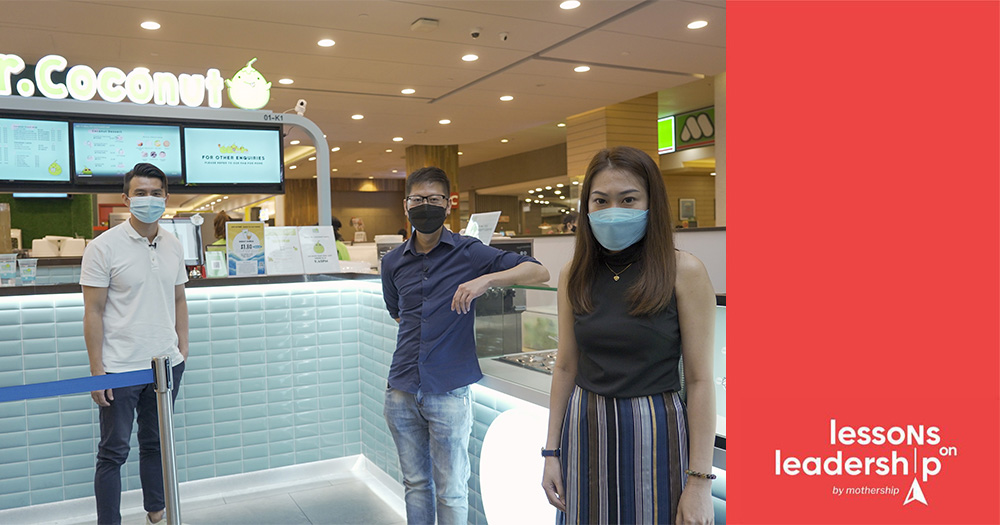Follow us on Telegram for the latest updates: https://t.me/mothershipsg
If you need evidence of how much of a staple the coconut shake has become in Singapore, just pop by one of Mr Coconut’s 31 outlets around the island.
Chances are you’ll likely stumble upon the sight of thirsty Singaporeans undeterred by the long queue they’re standing in, all determined to get their hands on an ice-cold plastic cup of coconut goodness.
As journalistic practices dictate, one must declare their personal interests in a subject – I am an avid Mr Coconut drinker (large with 25 per cent sugar, thanks for asking), and though I hate the idea of idling in single file formation, I have now made an exception for Singapore’s latest beverage craze.
However, my reason for meeting with Mr Coconut’s founders at their Jurong Point outlet is not to try and secure a lifetime supply of their drinks but instead to find out the story behind the business’ success.
The outlet, true to form, has an unabating queue of customers from every demographic you can imagine; kids in school uniforms, middle-aged aunties, and young adults in office get-ups all passed through Mr Coconut’s premises in the middle of the shopping centre’s atrium where I was seated with Andrew Cai, Vivian Yeo, and Lucas Lin to discuss their journey so far.
It comes as a surprise that despite the chain exploding in popularity seemingly overnight, Mr Coconut actually came within an inch of closing their doors for good at one point.
Xiang Yu Icy House
Back then Cai, who is 38, and Yeo, 34, had one store – right outside Far East Plaza in Orchard.
The pair got the idea for their coconut shake from Yeo’s hometown of Melaka, where it is popular fare among both locals and tourists.
“We felt that we could try it out in Singapore because it's a humid country,” explained Cai.
After spending about a year-and-a-half researching and refining their own recipe, the couple opened their first store in 2015, called Xiang Yu Icy House.
That first year, Cai told me, was marked by a lack of focus.
“We were worried that having only one kind of drink is very hard to survive in Singapore,” said Cai, “so we added a lot of drinks that were non-coconut related.”
In a menu that included offerings from bubble tea to gelato, the coconut shake – the original inspiration for the store – was crowded into obscurity.
Their most popular product turned out to be bubble tea, though sales – which would hit about S$300 on a good day and S$100 on a bad day – were not enough to cover the hefty monthly rental of around S$14,000.
The math simply wasn’t adding up and it wasn’t long before the business was burning a massive hole into their savings.
“We didn’t have any F&B experience so we wasted a lot of money,” reflected Cai, who was at the time working as an employment agent while Yeo worked as an accountant.
The couple’s flexible work schedule allowed them to maintain their jobs while running the Far East Plaza store, but Xiang Yu Icy House was quickly taking over Cai’s every waking moment.
“This was the period that we were going to be nearly bankrupt, we were really stressed. Every day, seriously, we cannot sleep.”
Cai remembers laying awake at night in his bed obsessing over how he was going to turn things around and ruminating on strategies to attract customers to his coconut shake.
He and Yeo had a product they believed in but it just wasn’t getting the attention it deserved.
No choice but to make it work
It was around this time that Lin, 34, joined the business.
“I invited Lucas (Lin) to join us because I felt he had the ability to help us, especially now that we had made the decision to continue,” said Cai.
Lin remembers being “quite shocked” but ultimately “grateful” that Cai and Yeo thought of him.
 Lucas Lin was a friend of Cai and Yeo and a real estate agent before joining Mr Coconut. Image by Andrew Wong
Lucas Lin was a friend of Cai and Yeo and a real estate agent before joining Mr Coconut. Image by Andrew Wong
A friend of Yeo’s, Lin – who was working as a property agent at the time – had actually helped the couple right at the beginning of their endeavour with finding a suitable space.
The Far East Plaza spot, he told me, was not his first choice; Lin had instead suggested a place with much cheaper rent, in the range of S$3,000 to S$5,000 rather than the S$14,000 a month unit they ended up renting.
Yet, Lin looks back on the decision as a somewhat fortunate one:
“We’ve also said before that if we had started with that rental – S$3,000 to S$5,000 – we may have just given up already.”
Ironically, having already ploughed months of expensive rent into the business, the trio felt that they had accrued too much “damage” not to try and make things work. It was almost as if their only chance of escaping the financial hole they’d dug for themselves was to somehow find success with their coconut shake.
The big gamble
It was 10 months into the business, with Cai, Yeo, and Lin, on the verge of packing up shop, that a friend suggested they needed an overhaul.
“Our finances were drying up, so we had a decision to make on whether we should give up,” said Cai.
In Yeo’s words, the trio decided to give it “one last chance – we would revamp”.
“The coconut shake itself, it’s actually very sellable,” Lin said.
“We knew that this product could work, it was only a matter of people trying it. So we needed to be focused on that point.”
This principle – along with a sense of all that was at stake – drove the revamp of Xiang Yu Icy House.
As Cai retold it:
“I was afraid already. I didn’t want to do something that was not direct. I wanted to be very direct. So we changed the name to Mr Coconut, so everyone would know what we sell.”
Along with the name change came an extreme streamlining of the store’s offerings. By December 2016, Mr Coconut was only selling products related to coconuts.
In effect, the move was almost a reaction to the popularity of bubble tea.
Customers were constantly coming to Xiang Yu Icy House and perhaps overwhelmed by the myriad of choices reached for the first familiar item on the menu.
Removing bubble tea was a big gamble – Cai, Yeo, and Lin were basically deciding to double down on their product, one that was untested in Singapore – but it was the only way that they were going to get their shakes into the hands (and mouths) of customers.
 Image by Andrew Wong
Image by Andrew Wong
 Mr Coconut's latest outlet, located in Chinatown Point. Image courtesy of Mr Coconut
Mr Coconut's latest outlet, located in Chinatown Point. Image courtesy of Mr Coconut
Aggressive expansion
By now, you would’ve surmised that their gambit paid off. Things instantly picked up for Mr Coconut after their rebranding.
“Our sales increased maybe by about two to three times,” said Cai.
A year later, in 2017, stable sales gave the trio the confidence to open another outlet. And by 2019, teeming with belief that the coconut shake could hold a status comparable to bubble tea, Cai, Yeo, and Lin set their sights on having a store in “every corner of Singapore”.
Looking back on it, the aggressive expansion from 2019 through to 2020 was probably when Mr Coconut really started to make waves in Singapore.
However, I get the impression that the business' success didn’t really dawn on Cai, Yeo, and Lin until 2020’s circuit breaker.
Rules at the time dictated that Mr Coconut’s outlets – deemed non-essential – would have to close, and so the trio and a few staff retreated to a central kitchen.
There they were inundated with bulk orders from both loyal customers and new fans.
“From morning to night,” remembered Yeo. “It was non-stop!”
“We are really quite lucky because after the circuit breaker we were able to reach out to more people and have them try our product,” explained Lin.
“We had our (new) outlets ready also, so a lot of people were able to get the product easily at their locations... that was actually the big spike.”
 (L-R) Lin, Cai, and Yeo. Image by Andrew Wong
(L-R) Lin, Cai, and Yeo. Image by Andrew Wong
Passing fad or here to stay?
Further proof of the trio’s success can be found in the multiple coconut shake competitors that have entered the fray and the growing ubiquity of vendors — although they were by no means the first to bring the beverage to Singapore.
Those thirsting for a coconut-based beverage have never been more spoilt for choice with options like CocoBoss, Co+Nut+Ink, Coconut Queen, or Coco Cane sprouting up around the island.
While this undoubtedly has increased the pressure on Mr Coconut, Cai told me he is unperturbed.
“I’ll just focus on my part... we cannot stop them if they want to copy us. It means we’re doing good.”
“We’re just focused on our own plans and goals,” he added.
“It also reflects that we are being followed in a way,” chimed Lin, “We were setting the trend”.
One suspects that the next hurdle Cai, Yeo, and Lin will have to overcome is to move from extended fad to having a cemented position in Singapore’s culinary pop culture.
Writing at the height of the coconut shake’s popularity, The Straits Times food editor described the situation using words pregnant with forewarning when she referenced “people bored of bubble tea” who had “moved on to another craze”.
If even the omnipresent bubble tea was vulnerable to a waning in favour, what more the less established coconut shake?
Cai, Yeo, and Lin seemed unbothered when I broached the topic with them.
The trio now has years of "paying their dues" to fall back on – experiences that have taught them to grit their teeth, make painful decisions, and eventually, evolve for the better.
Innovation remains a large part of Cai’s job scope, with the 38-year-old constantly tinkering and developing new products. Already, Mr Coconut is dipping their toes in moving beyond just serving beverages to incorporating coconut-based desserts into their stores.
As for me, I still haven’t tired of the original plain coconut shake (once again, in case you’re taking orders, that’s 25 per cent sugar, thank you very much). And as I watch the never-ending flow of patrons queuing up, paying, and patiently waiting for their receipt number to be called up, I can’t help but suspect that this "fad" is far from passing.
Lessons on Leadership is a Mothership series about the inspiring stories of Singapore’s business leaders and entrepreneurs, as well as the lessons and values we can learn from their lived experiences.
Top image by Andrew Wong
If you like what you read, follow us on Facebook, Instagram, Twitter and Telegram to get the latest updates.
